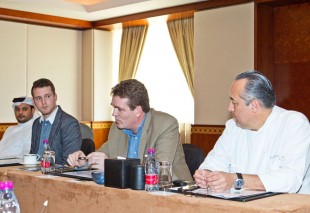

SIAL Food Innovation: Doha roundtable

International food distributors won’t take the risk of bringing specialist food products into Qatar — and that’s damaging the development of the restaurant trade in the country. That was one of the conclusions of the Doha roundtable debate.
“It’s back to basics — to healthy pure products,” said David Sosson, hospitality manager at Aspire Zone Foundation and president of Qatar Culinary Professionals. “With great products, chefs are more likely to innovate. But chefs here don’t have the same great products as elsewhere. Dry food is easier, but fresh is difficult.
“To be authentic is difficult in Qatar. How many quality suppliers are there here? Four? Dubai has four or five times more. In a supplier monopoly, they dictate — and you have to innovate with — what’s on the market.
“When more hotels and restaurants open up and we gain the help of the municipality, it will help. But if you have one Moroccan restaurant, why would a supplier take a risk on just one?”
Grand Hyatt Doha executive chef Jean–Christophe Fieschi added: “Innovation comes with competition, and follows with the right products coming into the country.
“Qatar is like Dubai was 25 years ago. You might find a nice tomato, but not Angus beef. We need a network because local suppliers don’t have enough production and international suppliers won’t take the risk.
“Sometimes there’s more choice in the supermarkets than from [trade] suppliers.”
“For me, innovation is using an ingredient in an unexpected way,” said Natalie Wherlock, a food blogger at Lemon & Mint, adding that “great chefs will initiate the product supply” to source those ingredients, leading Abdulrahman Alharmozi, founder of where2eatqtr, to say: “We need to create more chefs in Qatar. Training here is expensive and useless.”
“Where are the home-grown [restaurant] brands?” asked Patrick Hulbert, editor of Time Out Doha. “Food trends should be starting here, and we should be less worried about what’s happening elsewhere.”
The panellists agreed that it was important to identify original Qatari dishes, and to encourage hotels and restaurants to add them to their menus.
Fieschi challenged: “To open a nice restaurant, you need 10 appetisers, 10 mains etc. But can you tell me three Qatari dishes?”
“Qatari food is pure family food. The best of it is found at home,” insisted Sosson.
“That was the case in France until we created chef schools and education — then you develop standards and rules. Middle Eastern food is still in the family. We need to translate it into restaurants.
“People who cook Qatari food aren’t ready to take a business. So how do we transfer that knowledge? It’s a cultural problem — and not easy.”
On the question of international cuisine, the panellists argued on the point of whether food should be authentic and true to its cultural roots, or adapted for local tastes.
Fieschi argued: “People look for authentic food. Fusion cuisine will always be overtaken by something authentic — and that’s what leads to long-term success. Fusion food just causes confusion in the restaurant market.”
But Doaa Jabir, the blogger behind Hungry Birds Doha, disagreed. “This food need to appeal to the market. It has to be Middle Easternised. Food has to be hearty in the Middle East. They live life king-sized in this region.”
She asserted that doing so still left plenty of room for chefs to innovate. Jabir said: “I recently tried falafel soup — it was like drinking a falafel!”
A WORD FROM OUR SPONSOR...
Rizwan Mustafa, group marketing director — Middle East & ASEAN, SIAL Middle East says: “Innovation is the DNA of SIAL events worldwide and the Middle East is no exception. This is why SIAL Middle East partnered with Caterer Middle East to discuss food innovation in the region with a series of roundtables in Doha, Riyadh and Jeddah.
“Participants in each city offered their unique perspectives on innovation, including the challenges that hamper it. One of the common themes emerging from these discussions was the problem of sourcing the right ingredients to achieve authenticity. The limited availability of suppliers willing to import specific ingredients is a major hindrance and multiple channels of import are hence necessary to ensure that horeca and foodservice have a consistent supply of required ingredients.
“SIAL Middle East promotes innovation in the food, beverage and hospitality industry. It provides an ideal platform for culinary professionals to act as influencers and push distributors and suppliers within their respective regions to import their required products.
“In order to showcase the most innovative products in the region, SIAL Middle East features a dedicated zone within the event called SIAL Innovation, and an associated awards programme. Last year, out of the original 142 food and beverage products entered, 42 were shortlisted, out of which 10 finalists were selected. Eventually Camelait Premium Camel Ice Cream by Al Ain Dairy was named the Gold Award Winner.
“Winners from all SIAL events in the past year will be present in person at SIAL Middle East, so visitors will be able to taste and try food products that have won the prestigious Gold Award in Paris, China, Canada, Manila and Jakarta.”
SIAL Middle East 2015 takes place on December 7-9, at the Abu Dhabi National Exhibition Centre. For more information, visit sialme.com